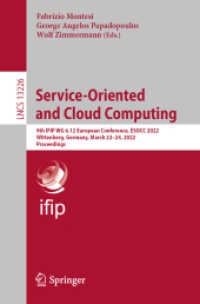- ホーム
- > 洋書
- > 英文書
- > Philosophy
Full Description
The Unspoken Morality of Childhood reflects the thoughts of a senior ethicist as she ponders the moral questions we all encounter in everyday life. Each essay describes a commonplace event: a child learning to read or asking to be quizzed on spelling, first graders bonding on playground swings, brothers talking on the way home from school, a young girl leaving for college. Monroe sensitively infuses these moments with a thoughtful tenderness that reveals the beauty in our daily routine and the wisdom all parents crave. Her reflections on the ethical issues raised as part of our daily lives lend valuable insight into critical moral topics: how nostalgia and love of home can be exploited by unscrupulous politicians who turn fear into political weapons that divide us but elect them. How forgiveness may not always be the best way to move on after a hurt. Moral imagination's unique ability to help us conceptualize our way out of seemingly intransigent problems. Agency, passion, unconditional love, and the painful growth that can accompany loss. Above all, Monroe highlights the tremendous power of identity and self-esteem and the recognition that we must honor the humanity in others in order to fully claim it in ourselves.
Contents
Acknowledgments: From Babysitters to Elephants and John Stuart Mill's Maxims for Children; Preface: We Tell Ourselves Stories in Order to Live; Introduction: The Moral of the Story; Chapter 1. Walnut; Chapter 2. J. O.; Chapter 3. Forgiveness and the Thin Red Line; Chapter 4. "I Got Nothing!"; Chapter 5. "It's an Important Political Problem. I Should Know About It." Agency; Chapter 6. Nicole's Father Is Not German!; Chapter 7. Science Fiction Fantasy, Moral Imagination and the Ability to Conceptualize Your Way Out of a Problem; Chapter 8. Passion; Chapter 9. Cat; Chapter 10. Best Friends Forever; Chapter 11. Wretched, Slacker Disney Child; Chapter 12. The Last Lecture.







